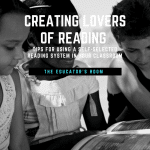Teaching children to read seems to be a mystery to everyone except primary school teachers. Someone recently asked: Is it true that it is not necessarily a teacher’s job to teach children to read? Is our job to give them the skills to make them better readers? Does any teacher have the time to teach all their students to read?
I sat blinking at the question. It startled me. Obviously, this was not a Kindergarten, First, or Second grade teacher who asked. Teaching reading skills and strategies are our world. As a Second grade teacher, I had to reach every student and move them closer to independence. Each fall, I had some children who were nearly there, a few who only knew a handful of words, and the majority in between.
Some kids seemingly learn to read through osmosis but most do not. There is no magic wand that primary grade teachers use to teach a child to read. Learning to read is a melding of a combination of skills and strategies. It is a slow and steady process for most children. It starts with the ABCs and learning to scan left to right. Then come phonemes, or in non-teacher speak, letter sounds. Children learn to recognize that spaces between letter groups break up words. They learn to recognize patterns such as rhyming.
Mastering reading is rather like learning to ride a bike. First, you begin with a tricycle, low to the ground with lots of support. It takes a while to figure out how to pedal. Next comes the wobbly ride of training wheels. Finally, you try for a while with someone holding on behind you. Suddenly, the “aha” moment occurs and you are balancing and pedaling at the same time. Even then, it takes a while to master going around the corner. My sister, who learned most things easily, including reading and bike riding, had sores on the tops of her feet from dragging them on the ground to stop. We realized she hadn’t learned about brakes. That was the next lesson.
Like bike riding, it takes time to become an independent reader. A large part of a primary teacher’s job is focused on reading. Reading is taught in a lot of ways, in a wide variety of group sizes, and with lots of practice in the classroom. Walk into a primary classroom and look for all the places words show up in the room. Everything is labeled. There are places to sort words, little skinny books to read, and materials to write the words. Kids carry their sight words on little rings when they sit in line. We teach strategies with names like “word families” and “chunking.” Social studies and science words are added to word walls. We read aloud as we point at words, we model choral reading and partner reading, and we give children lots and lots of time with books. We work with small groups of four or five, to read text at their level, first echo reading, and then working on the skills that group needs. We document progress and press onwards.
Even personality affects how a child learns to read. The thoughtful girl with the huge vocabulary may take longer to gain fluency than her easy-going friend because she wants to check and recheck everything she does. The relaxed student may master the methodology of fluency but not comprehension. In fact, mastery of fluency with a lack of understanding of what was read is a common problem with English as a Second Language learners. They have grasped the decoding but not necessarily what the words mean.
I tend to think education works best when it is a collaboration between parents and teachers, or at least supported by parents. All readers will be more successful if they work on it at home. Unfortunately, it is down to the teacher if you don’t have that support. As one mother once told me, “We don’t really read at our house.” Teachers just have to recognize this situation and give that child extra support. We will spend more time with him as the rest of the class moves toward independence. My lowest readers read with me in a small group every (or nearly every) day. They needed more practice with the beginning skill sets while the rest of the class moved onto tougher strategies. It is differentiation over and over.
Teaching reading is layering skills upon skill. English is a difficult language. The favorite parent phrase is “Sound it out.” Well, that doesn’t work with “was” or “one” or “Wednesday.” The word “read” can be pronounced two different ways. Exposure, checking for understanding, and practice are key components to support beginning and emergent readers. There is a balance between challenging children to read more difficult work and letting them read and reread what they love. Primary teachers have to make sure both are happening.
One day it will all connect. You may recognize it when you have to say a child’s name twice before they look up from their book. It might be when you see them turn the page without pause. It could even be when they get a puzzled look on their face and go back and reread the page before. These are all signs of secure readers. For me the absolute best was when a child suddenly laughed aloud at what they had just read. All of these are the “aha” moments of learning the balancing act of reading. Yes, they still have more strategies to master but they are definitely on their way to independence. It is a beautiful thing! No magic wand was needed.



